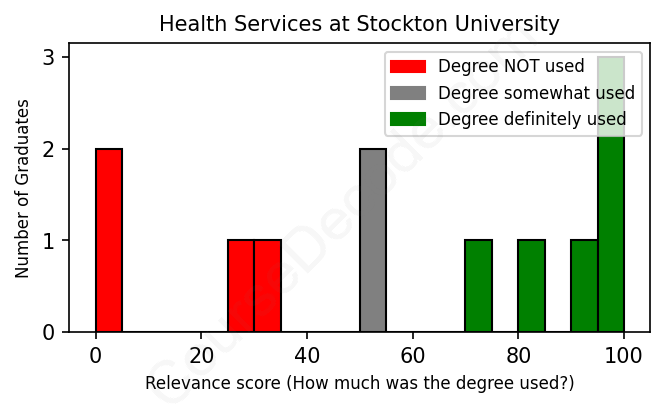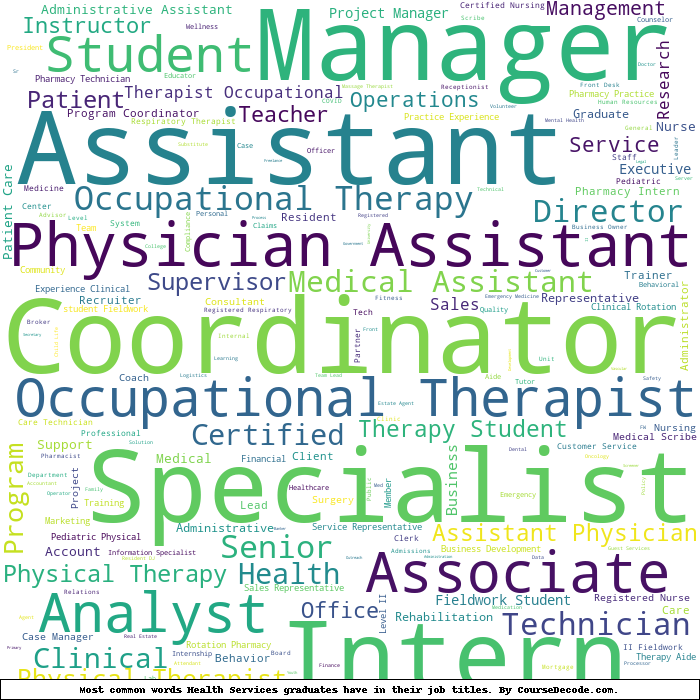
First, some facts. Of the Health Services graduates from Stockton University we've analyzed , here's how many have used (or NOT used) their degree in their career:

These are estimates based on AI analysis of 12 LinkedIn profiles (see below).
The verdict? Below average. Overall, with an average relevance score of 58%, Health Services graduates from Stockton University have a lower likelihood (-9%) of finding work in this field compared to the average graduate across all fields:
And for comparison, here's the chart for all profiles we've looked at across all degrees.
Also, after graduating, only 25% of these graduates have pursued further education other than another Bachelor's degree (such as a Masters degree or other), compared to the average across all profiles of 35%. This suggests a Bachelors degree is enough for most Health Services graduates, and it's normal to look for work straight after graduation.
See the details:
|
Relevance score: 90% We think this person has gone into a career highly relevant to their degree. We think this person has gone into a career highly relevant to their degree.
DEGREE INFOGraduated in 2017 from Stockton University with a Bachelor of Science - BS in Health Services. Also pursued further education since (see below). JOB HISTORY SINCE GRADUATIONResident Assistant Stockton University Jul 2017 - Dec 2018 Director  Linden Parks and Recreation Special Needs Day Camp Jun 2019 - Aug 2020 Speech Language Specialist  North Plainfield School District Aug 2019 - Present FURTHER DEGREES DONE SINCE GRADUATINGMaster of Science - MSStockton University 2017 - 2019 ABOUTNo information provided. |
The top 10 most common jobs done by the graduates we've analyzed (ranked most common to least) are:
Based on the analysis of LinkedIn profiles from graduates of the Health Services program at Stockton University, it seems that a wide variety of jobs have been taken by these individuals since their graduation. Some of the most common occupations include roles in education, retail management, and customer service. For instance, many graduates ended up in positions like private tutoring, assistant management in retail, or even as teachers, which don’t necessarily use the specific skills and knowledge acquired in a health services degree. It appears that while a few roles might touch on health-related concepts or require some level of understanding of health and wellness, most of these jobs are fairly detached from the core competencies associated with health services.
However, there are also notable exceptions, particularly in roles like Genetic Counselor Assistants, Client Services Managers in health care settings, and Certified Nursing Assistants, where the knowledge of health services is not just useful but essential. These positions highlight a more direct application of their degree and tend to involve significant engagement with health-related responsibilities. In summary, while there’s a mix of job relevance among these graduates, a good portion of them seem to be working in roles that don't fully utilize their education in Health Services. So while it’s great to see some key graduates in relevant jobs, a considerable number have ventured into fields that might not align as closely with their studies.
Here is a visual representation of the most common words in job titles for Health Services graduates (this is across all Health Services graduates we've analyzed, not just those who went to Stockton University):

So, looking at the career paths of Stockton University graduates in Health Services, it seems like there’s a pretty mixed bag going on. Right after graduation, many graduates snag jobs that are somewhat related to health services, like being a Patient Coordinator or a Genetic Counselor Assistant, which is great because it means they’re starting out in fields connected to what they studied. However, others have taken more offbeat routes, like working as a Private Tutor or a Production Cast Vocalist, which aren't directly tied to the health sector at all. This variety suggests that while some are jumping into relevant careers, others are exploring different options.
Fast forward five years, and it looks like some graduates have landed roles with more responsibility, like the move from a Clerk at a liquor store to a Director at a Special Needs Day Camp. But on the flip side, there are those who still seem to be in positions that don't particularly leverage their Health Services degree, like the Resident Assistant or the Administrative Assistant roles that don't scream "health services." So, while there's evidence that some people have progressed into solid careers within healthcare, others might still be figuring things out, circling back to roles that aren't as relevant or impactful in the health services field. Overall, it looks like there’s a good mix of career trajectories, with some graduates finding their stride in health-related roles while others venture into completely different paths.
Hey there! So, if you’re thinking about a Bachelor’s degree in Health Services at Stockton University, it’s generally considered to be on the easier side compared to some other majors, especially if you're interested in the field and have a genuine passion for helping others. The coursework is often pretty accessible, with a mix of introductory classes and some specialized topics, so it’s manageable for most students. You’ll have your share of projects and papers, but if you stay organized and keep up with your studies, you should be able to handle it without too much stress. Overall, it's not a walk in the park, but it’s definitely doable if you’re motivated!
Most commonly, in the LinkedIn profiles we've looked at, it takes people 4 years to finish a Bachelor degree in Health Services.
Looking at the jobs these Health Services grads from Stockton University have landed, it seems like they’re doing okay but not exactly raking in the big bucks. Some of them, like the Genetic Counselor Assistant or the Client Services Manager, probably have more stable, higher-paying jobs, especially in healthcare settings, which generally pay better. Others, like the Private Tutor and the Waitress, might not be earning as much, especially in the earlier stages of their careers. Overall, it appears they’re making a reasonable living, but if we’re being real, it's likely not extravagant, especially considering the cost of living and varying salaries in the education and healthcare fields.
Here is a visual representation of the most common words seen in the "about" section of LinkedIn profiles who have a Bachelor degree in Health Services (this is across all Health Services graduates we've analyzed, not just those who went to Stockton University). This may or may not be useful:

Here are all colleges offering a Bachelor degree in Health Services (ordered by the average relevance score of their Health Services graduates, best to worst) where we have analyzed at least 10 of their graduates:
| College | Score | Count |
|---|---|---|
 The Ohio State University The Ohio State University
|
88 | 14 |
 Quinnipiac University Quinnipiac University
|
88 | 10 |
 Grand Valley State University Grand Valley State University
|
87 | 16 |
 University of Tampa University of Tampa
|
87 | 10 |
 Stony Brook University Stony Brook University
|
80 | 15 |
 Boston University Boston University
|
79 | 12 |
 University of Connecticut University of Connecticut
|
78 | 26 |
 Florida Agricultural and Mechanical University Florida Agricultural and Mechanical University
|
76 | 12 |
 Texas A&M University Texas A&M University
|
72 | 16 |
 University of South Florida University of South Florida
|
72 | 26 |
 Boise State University Boise State University
|
71 | 11 |
 University of Central Florida University of Central Florida
|
68 | 47 |
 Florida Gulf Coast University Florida Gulf Coast University
|
68 | 10 |
 James Madison University James Madison University
|
66 | 26 |
 University of Missouri-Columbia University of Missouri-Columbia
|
66 | 17 |
 California State University, Fullerton California State University, Fullerton
|
66 | 13 |
 California State University - East Bay California State University - East Bay
|
66 | 10 |
 Arizona State University Arizona State University
|
62 | 10 |
 Cleveland State University Cleveland State University
|
60 | 10 |
 Stockton University Stockton University
|
58 | 12 |